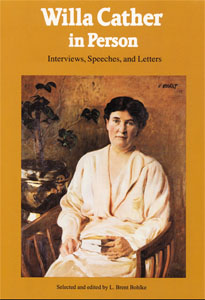from Willa Cather in Person: Interviews, Speeches, and Letters
Selected and edited by L. Brent Bohlke
Lincoln & London: University of Nebraska Press, 1986
1925: CHICAGO
Following her speech at Bowdoin College in the late spring of 1925, Cather also accepted an invitation from Nathaniel Butler, assistant to the president of the University of Chicago, to give one of the William Vaughn Moody lectures there. She was quite nervous about the engagement and wrote to her old friend, Irene Miner Weisz, who lived in Chicago, asking her to make all the necessary arrangements for travel and lodging and to be with her at the lecture to hold her hand (ALS, Irene Miner Weisz, 4 November 1925, Newberry Library, Chicago, Illinois).
The lecture was given on the evening of 17 November 1925 at Mandel Hall to what was called a capacity audience. She did not feel the speech went well and seemed to blame it upon the ugliness of the lecture hall. It made her feel wretched and caused her to stutter (ALS to Irene Miner Weisz, 20 November 1924, Newberry Library, Chicago, Illinois). The lecture was reported by the Daily Maroon, a university publication, and at greater length by the Tribune.
Two days later, she left for Cleveland to fulfill another speaking engagement before the Cleveland's Women's City Club (see Interviews, "1925: Cleveland"). That lecture went well, she felt, because the hall was lovely; the colors and soft lighting were relaxing, and the young, well-dressed audience—including several men—put her at ease (ALS to Irene Miner Weisz, 20 November 1925, Newberry Library, Chicago, Illinois).
"MACHINE-MADE" NOVEL DEPLORED
Prevalence of the "machine-made" novel was deplored by Willa Cather, noted writer, last night in a lecture on "The Tendencies of the Novel Today," before a capacity audience in Mandel Hall.
"A commuter's convenience" was one of the terms which Miss Cather applied to the type of novel which she declared predominates today.
The beauty creating surge is not menaced so much by commercialism as by a "low form of itself," the authoress warned, condemning the importance attached to "plot" in the modern novel.
An optimistic outlook for the future of the novel was, however, expressed by Miss Cather.
Chicago Daily Maroon, 18 November 1925.ART NOW ONLY RULE FOR WRITING NOVELS, WILLA CATHER SAYS
Willa Cather lectured this week at the University of Chicago on "The Tendency of the Modern Novel," and she said so many pertinent and important things that it seems only fair to share them with you who did not hear her. The novel—as an art form, as opposed to the machine-made novel—has changed, she said.
It has changed, for one thing, in the matter of length. It is as long now as the author believes it should be to express what he wishes to say, and it is, therefore, either shorter than the old novel or longer, as the case demands. The rules of novel construction are not adhered to as they used to be.
She mentioned as an example The Death of Ivan Ilych, by Tolstoy, which begins with a funeral, proceeds to a vivid tale of Ivan's life, and ends with his death. According to all rules, such a technique is wrong. As art, it is right, she said. To have done that novel in any other way would have been as tragic and as silly as to have cut up a child and rearranged its members differently.
The novel is behind the other arts in that very matter, she said. A painter can see a pretty little clump of trees, and behind it the great cathedral, and, if the clump of trees allures him, he will paint his trees, sketch in the cathedral in his proper perspective, and go home pleased with himself. The novelist will see the clump of trees, but he is pressed to realize that behind them there is that great cathedral, and he is a rare artist who contents himself with the trees. The novel is like democracy, she said, with all of its virtues, but likewise all of its faults.
She spoke at length about the new freedom of subject matter. She voiced the belief that periods of the greatest freedom have never been periods of the greatest beauty in literary creation. The very fact that there are restrictions, things that one must not talk about, tends to make the art a richer one. That is also true of language, she said. There now are being used words which formerly were to be found only in patent medicine almanacs, and she bade her auditors beware of a language which had no bad words in it—and any word, by being generally used, ceases to be bad.
She said that the power to stir the reader erotically was the charge of dynamite which every great author had, but that, used to excess or even used without distinction, the charge lost every whit of its power.
"There is such a thing in life as nobility," she said, "and novels which celebrate it will always be the novels which are finally loved."
The novel of the future will be more experimental, she ventured. It will be more concerned with the emotional pattern of the characters than with the event pattern. Many happenings may be, as events, startlingly important in a life, but they may leave a person almost cold emotionally. It is the true emotional pattern of his characters which the author will chart in the future. He will write about whatever makes an impact on his mind.
Chicago Daily Tribune, 21 November 1925.
